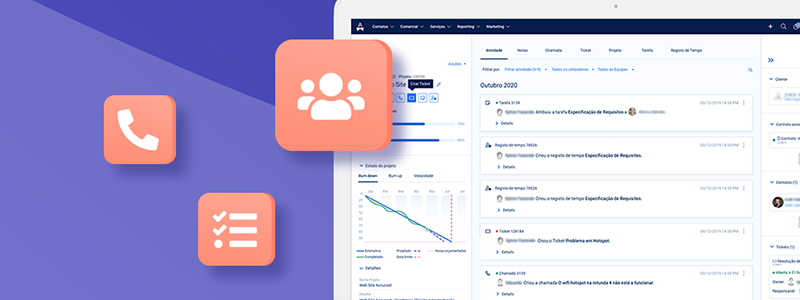Project managers have the difficult task not only of launching a project, but also to ensure that it runs smoothly and to collaborate with team members and the client. In fact, it can be quite stressful. But if you plan and manage the project properly, it doesn’t become so chaotic.
If this is your first time managing a project, here’s how you can manage it from start to finish successfully.

1. Plan your project
All project managers will say that the success of any project is purely a matter of planning. Developing a plan may require some effort initially, but in the long run, having a clear vision of the project will save you time, money, and many headaches.
To start creating the project’s plan, focus on the following elements:
Identify your project
To start, you should deconstruct the project. For example, telling your team that you want to build a house is very broad. But telling them that you want to build a vacation home on the beach gives them a better understanding of what the project really is.
Define goals and objectives
Now it’s time to establish the goals and objectives you want to accomplish. Your goals are the ‘what,’ such as increasing the amount of visitors to your website. Your objectives are the ‘how.’ If you want to increase the amount the visitors to your website, you could accomplish that by launching a content marketing campaign.
Define tasks
You will have to clearly define the tasks you need to complete to finish the project. For example, if you are planning to launch a content marketing campaign, key tasks would include starting a blog, hiring writers, researching content your audience considers relevant, and promoting your content.
Build your team
Who are the people who will help you with the project? What are your roles and responsibilities? Usually, your team should include the project sponsor, experts to define the scope of the project, the project manager, the team responsible for working on the project. Try to keep every team member as motivated as possible.
Create a timeline
Divide tasks into phases and set deadlines for when you want your goals and objectives to be completed. Knowing how long each phase takes to complete helps you keep the project on track.
Get feedback
Once you’ve defined your initial plan, seek feedback from your team, stakeholders, and customers before proceeding.
Adjust your plan
Even the most efficient project plan will not take into account unforeseen events that may arise. Have some flexibility with your plan so you can adjust it according to circumstances.
Once you have your plan in order, and everyone involved is on board, write the plan so it can be used as your guide during the project.

2. Keep the project on track
Having your plan clearly defined can help you throughout the project, but that doesn’t mean you can expect it to be completed without constantly analyzing, reviewing and monitoring every phase of the project.
To ensure that the project stays on track:
Schedule regular intervals to check on the project
Whether it’s every two days or once a week, you need to schedule a period to review the project’s progress.
Be flexible
Trust your team when you are working on the project. Although you have a vision and a plan in place, your team has the know-how and experience to make it a reality. Keep an open mind and listen to the team’s opinions.
Communicate with your team
Keep everyone informed and provide frequent updates. Better yet, schedule weekly meetings so everyone has access to the latest updates and can address pertinent issues. For instance, if a deadline has to be had to be moved up and your team doesn’t know this information, how can you expect them to finish their work by the new deadline?
Solve the problems before they occur
Prepare for any obstacles in advance, so you can deal with them before they become a problem. For example, if you know that you need a copywriter to write 5 articles daily on the blog, then make sure you have someone who can handle this workload.
Give instructions
As project manager, it’s your responsibility to keep the team informed and make sure everything goes smoothly. To do this, you need to provide your team with the appropriate resources and information so they can complete the project on time.

Use a project management tool
No matter how detailed your plan is, you are forced to face a series of setbacks. Fortunately, technology has made all management processes much more effective and convenient, from scheduling media publications to customer relations.
With the Airdesk collaboration platform, you will work better, faster and smarter By tracking all your projects, tasks, business and time records, you’ll feel in control and more motivated to meet your short and long term goals.
Time Management
As a project manager, you must also be able to manage your time effectively. Otherwise, how do you expect the project to be completed on time?
Here are some of the most effective time management techniques:
Assigning tasks
If you are overloaded, don’t hesitate to assign some tasks to a qualified and trusted team member so you can concentrate on your most important tasks.
Prioritize your tasks
Make sure you are not late on your more urgent tasks. Complete them first, then work on tasks that are not so time-sensitive.
Hold more effective meetings
Keep your meetings short and make sure they don’t get off topic. Ask your team to share their ideas and give feedback on project progress.
Write today about tomorrow’s tasks
This will not only allow you to plan your day better, but also deal better with any crisis that awaits you first thing in the morning.
Use a collaboration tool
With Airdesk, you will know exactly how much time your team applies to each project, where more hours are being spent, the reasons that are causing inefficient time, and the hours exceeded per client.



